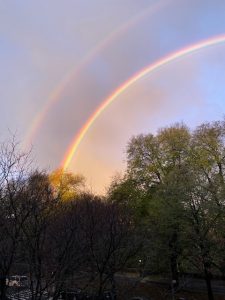When reflecting on what is most valuable about the Core Curriculum at Columbia, I always think about the community it fosters. But a closely related benefit of the core, which is both a product of and a contributing factor to that sense of community, is a more internal effect that comes from the specific type of learning that takes place in most core classrooms. While this kind of learning applies to liberal arts education more broadly, Columbia’s Core is, in many ways, a shining example of the benefits of including the humanities in higher education.

Rainbows over Riverside Park, Photo Credit: Juliet Paiva.
In my experience with the Core, the unique sense of community it fosters has always stood out the most. I think back to freshman year and starting college after spending the last thirteen years at a small suburban all-girls school where I grew up alongside the same group of sixty-something other girls in my graduating class. A place where I felt like I knew everyone and everything. It was jarring to find myself in college as one first-year student out of thousands within a university of tens of thousands and all within a city of millions. Taking Literature Humanities during my first semester at Columbia allowed me to get to know a small group of my peers in a more contained setting that felt like we were all part of one collective thing. But then, even beyond my specific section of Lit Hum, almost every other Columbia College first-year student I met took the same class and was reading the same texts, but just with a different instructor in another section. Love it or hate it, the collective experience of the Core defines the Columbia College journey in a way unlike any other aspect of college life.
However, what creates this unique community experience is not that we are all reading the same texts, but the different backgrounds we each bring into the core and the special personal realizations that environment promotes. I think a critical aspect of the humanities-centered courses in the core—Literature Humanities, Contemporary Civilizations, Music Humanities, and Art Humanities—is that they are not directly aimed at giving students the training to produce some specific end product. In other words, the point of these courses is not remembering the plot of the Iliad or memorizing the components of Kant’s categorical imperative, but building the skills necessary to be reflective and thoughtful about the different subject matter these courses cover and to do so in a collaborative way.
Arguably, and ideally, the most important thing the core does is that it helps shape the way we understand the world and what it means to be human. Since it is not directly aimed at producing knowledge of specific facts or procedures, it opens room for each person’s perspective to shape the learning environment. The small seminar setting is collaborative. It brings together groups of people from different places who study different fields to consider the same questions. In this way, the core brings us closer to understanding our own perspectives, but also to questioning and expanding them. Studying the humanities allows us to ask questions about human life from other points of view than our own. In a way, the most striking outcome of these core classes for me has been this new self-understanding, but not really in a limited, personal way, but through considering what it means to be human more generally.
The Core offers a space within the chaotic life of an undergraduate at Columbia to take each of our personal experiences in connection with foundational texts and works of art, and to coalesce all of it into a greater understanding of the world beyond each of us. Philosopher Martha Nussbaum argues in her book Not for Profit that the humanities are crucial for American democratic life. By fostering a greater understanding of humanity, we learn how to be better citizens, but we also learn how to be better thinkers and friends. It is easy to get caught up in the hundreds of pages of reading, the midterms, and the papers, but if done right, there is the potential to get something deeper out of this experience. The Core helps us know ourselves better by expanding the ways we see and understand the rest of the world.
